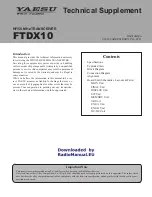
Glossary
82
GSR2700 ISX Operations Manual
D
DGPS—
Differential GPS. A technique to improve GNSS accuracy. It
primarily uses pseudorange errors at a known location to improve
the measurements made by other GNSS receivers within the same
general geographic area.
DOP—
Dilution of Precision. The geometry of the visible satellites is
an important factor in achieving high quality results. The geometry
changes with time due to the relative motion of the satellites. An
accuracy measure for the geometry is the DOP factor.
Datum—
A model of the Earth used for geodetic calculations.
E
Elevation mask angle—
An adjustable feature in GNSS receivers
that specifies a satellite must be at least a specified number of degrees
above the horizon before the receiver uses the signals from that
satellite. Satellites at low elevation angles (five degrees or less) have
lower signal strengths and are prone to loss of lock and multipath.
Ellipsoid—
A smooth mathematical surface that represents the
Earth’s shape and closely approximates the geoid. It is used as a
reference surface for geodetic surveys.
Ellipsoidal height—
The height above a defined ellipsoid,
approximating the surface of the Earth.
Ephemeris—
A set of satellite orbit parameters used by a GNSS
receiver to calculate precise GNSS satellite positions and velocities.
The ephemeris is used in the determination of the position solution
and is updated periodically. Available as “broadcast ephemeris” or as
post-processed “precise ephemeris”.
Summary of Contents for GSR2700 ISX
Page 2: ......
Page 3: ...Tplljb GNSS Receiver System GSR2700 ISX Operations Manual ...
Page 90: ......
Page 98: ......
Page 104: ......















































